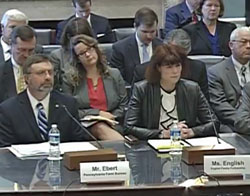 Misdirection may work well for magicians, but the Agricultural Retailers Association has not been distracted by the Occupational Health Safety Administration’s latest antics. The organization is responding to OSHA’s attempt to enforce rules on farm supply retailers before the rules have even been written. On May 6 the ARA sent a letter to Congress and the U.S. Court of Appeals for the District of Columbia to express their concern with this practice.
Misdirection may work well for magicians, but the Agricultural Retailers Association has not been distracted by the Occupational Health Safety Administration’s latest antics. The organization is responding to OSHA’s attempt to enforce rules on farm supply retailers before the rules have even been written. On May 6 the ARA sent a letter to Congress and the U.S. Court of Appeals for the District of Columbia to express their concern with this practice.
“Apparently, OSHA has come to the conclusion that rulemaking is necessary,” said Daren Coppock, President and CEO of the Agricultural Retailers Association. “But the agency still clearly indicates it intends to commence enforcement of the PSM standard on agricultural retailers beginning October 1, 2016, even though, by its own admission in a letter to the D.C. Circuit Court, the rulemaking may take as long as five years.”
OSHA issued a memo July 22, 2015, that reinterpreted the long-standing “retail exemption” to PSM and gave agricultural retailers just six months to comply with the complex and time-intensive regulation. Since then, OSHA has insisted — even in testimony to Congress — that rulemaking was unnecessary and it acted appropriately when the agency abruptly changed its guidance on PSM. Now, OSHA has told Congress and the Courts to look the other way as it improperly enforces PSM until rulemaking is completed.
“The agency is, in effect, hoping Congress and the federal judiciary are distracted by the rulemaking while it continues to violate the Occupational Safety and Health (OSH) Act and the Administrative Procedures Act by imposing an unlawful regulation that has not completed rulemaking procedures,” Coppock said.
The letter asked members of Congress to hold OSHA accountable and to force them to follow proper notice-and-comment rule making procedures. “Surely the Congress does not intend to give regulatory agencies the authority to change their regulations on a whim and then complete the necessary rulemaking procedures years after commencing enforcement,” the letter states.
ARA is asking Congress to pass H.R. 5213, the recently introduced Fertilizer Access and Responsible Management (FARM) Act, or pass the 2017 fiscal appropriates bills with language which would prevent OSHA from enforcing these standards on ag retailers. ARA is hopeful Congress will see through OSHA’s misinformation and put an end to this show.












